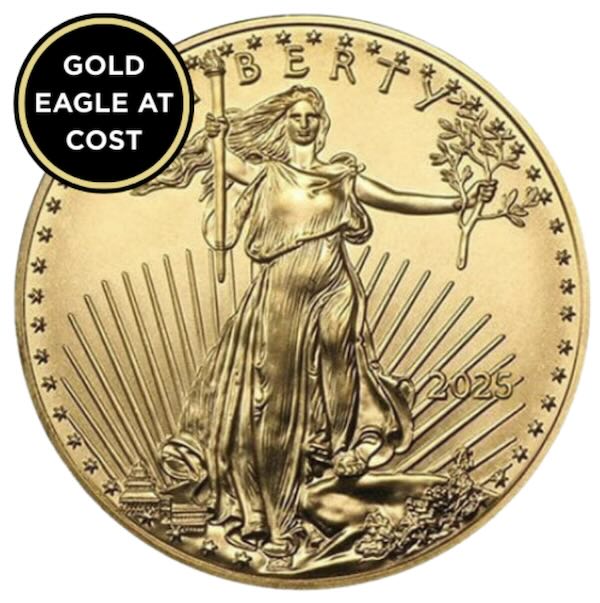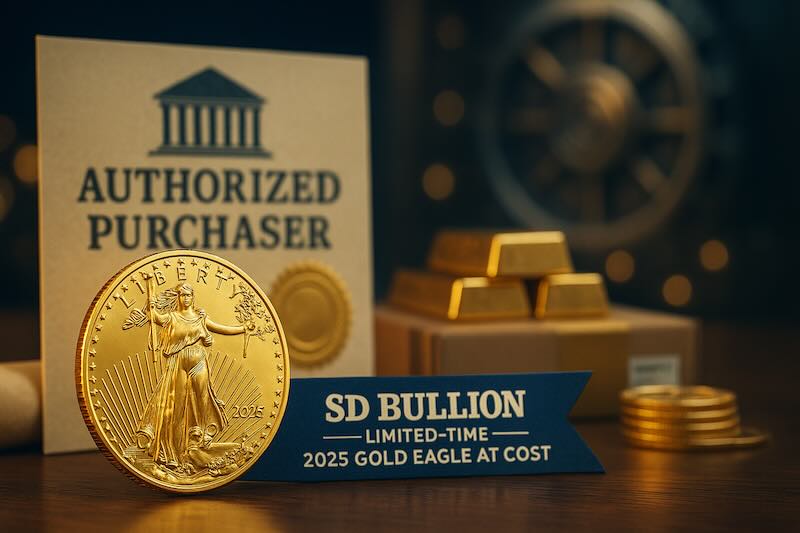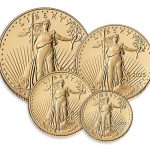SD Bullion announced in a press release and email to their customers that it has been named an Authorized Purchaser for U.S. Mint gold bullion coins (American Eagle and American Buffalo programs). As an AP, SD Bullion can buy newly minted bullion directly from the U.S. Mint for onward distribution to wholesale and retail channels.
To mark the milestone the firm offered a limited-time celebration deal on 2025 1 oz Gold Eagles sold at cost.

What is the Authorized Purchaser Program?
The U.S. Mint’s Authorized Purchaser program limits direct purchase of newly struck bullion coins to a small group of vetted institutions. The AP system exists to:
- Ensure orderly distribution of newly struck coins to the market.
- Preserve mint-to-market integrity by working with financially capable, compliant firms.
- Provide a primary channel of supply that dealers and sometimes large investors rely on for allocations.
An AP is distinct from being a retailer: APs purchase large allocations directly and then distribute to wholesalers, dealers, and (through their channels) retail customers.
How SD Bullion’s AP status may affect the bullion market
- Potentially better primary-market availability for customers.
With SD Bullion now able to take direct allocations, some supply that previously routed through a narrower set of wholesalers may reach the market faster and more efficiently. That can help reduce short-term scarcity during tight mint allocation periods. - Greater price competition on newly minted coins.
Additional APs increase the number of outlets that can acquire direct inventory. Over time that tends to compress dealer markups and lead to lower premiums for commonly traded items (1 oz Eagles, Buffalos), particularly when allocations are sufficient. - Faster response to spikes in retail demand.
APs can move mint allocations into the market quickly. When price-driven retail surges occur, more APs can help prevent huge premium swings caused by single-channel bottlenecks. - Improved wholesale liquidity for dealers.
More APs expand the wholesale network. With more APs, smaller dealers and local coin shops benefit from more sources and price competition in the wholesale markets, potentially narrower bid-ask spreads, and improved fill rates for customer orders. - Not an immediate cure for systemic frictions.
AP expansion helps distribution but does not directly solve unrelated operational constraints — for example, refinery backlogs, transport bottlenecks, or an across-the-board shortage of physical metal. Those issues can still produce premium volatility even with more APs active.
More APs Should Bring Lower Premiums
Also in recent months, Upstate Coin announced it was approved as an Authorized Purchaser. These successive AP approvals increase distribution capacity and competition and the wholesale level, long dominated by a small handful of companies.
From a practical, consumer-centered standpoint, increasing the number of APs has three clear advantages:
- Supply resilience: More primary channels reduce single-point-of-failure risk during allocation shortages.
- Price moderation: Competition among APs and the dealers they supply tends to reduce retail markups over time, especially on high-turnover items.
- Broader geographic distribution: Additional APs may serve regions or dealer networks that were previously underserved, reducing shipping delays and regional premium differentials.
All that said, benefits flow to consumers unevenly and usually on a timescale of weeks to months. Short-term price dislocations caused by macro shocks or operational constraints can still create localized premium spikes despite AP growth.
Sources & further reading: check the U.S. Mint’s Authorized Purchaser program and the issuing dealer’s announcement for full terms and the latest promotional details.
Disclosure: SD Bullion is a sponsor of FindBullionPrices.com. FindBullionPrices.com’s editorial team produces content independently; sponsorship does not dictate our analysis or recommendations. Readers should verify current prices and promotional terms directly with dealers before transacting.






